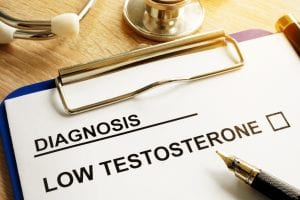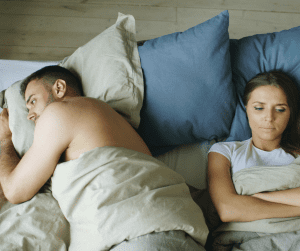It is impossible to turn on the TV or radio without hearing about “Low-T.” The medical condition, often referred to as low testosterone, testosterone deficiency (TD) syndrome, or male hypogonadism, is a significant men’s health issue that impacts quality of life for many men. At Arkansas Urology, our specialists provide expert care for men experiencing signs and symptoms of low testosterone, helping restore energy, confidence, and overall well-being.
Low Testosterone (Testosterone Deficiency): Symptoms, Diagnosis and Treatment
Signs and Symptoms of Low Testosterone
Recognizing the signs and symptoms of low testosterone is the first step in getting help. Many men dismiss these changes as normal aging, but proper testosterone treatment can make a difference.
Sexual Symptoms
- Reduced sex drive and low desire
- Erectile dysfunction or reduced sexual function
- Fewer spontaneous erections
- Sexual dysfunction that disrupts intimacy
Physical Symptoms
- Loss of body hair, pubic hair, or less facial hair
- Decreased lean muscle mass and increased body fat
- Fatigue, less energy, or low energy levels
- Weight gain and belly fat
- Reduced bone density and increased risk of fractures
- Changes in male characteristics and sex organs
Emotional and Mental Symptoms
- Depression
- Irritability or mood changes
- Difficulty concentrating and memory issues
- Lower confidence and motivation
How Low Testosterone is Diagnosed
Diagnosis begins with a detailed medical history and physical exam. Providers often order a blood test to measure total testosterone and free testosterone levels. Insurance companies require two low testosterones measured prior to 10AM for a clinical diagnosis. Additional testing may include luteinizing hormone (LH) and follicle stimulating hormone (FSH) to help determine if the cause is primary hypogonadism (testicles) or secondary hypogonadism (pituitary gland/hypothalamus). PSA (prostate specific antigen) testing helps monitor prostate cancer risk. These tests also look at red blood cells, sperm production, and hormone levels that affect sex organs and male characteristics. Working with an experienced men’s health team ensures accurate diagnosis and safe testosterone supplementation.
Treatment Options for Low Testosterone
Testosterone Replacement Therapy (TRT)
Testosterone replacement therapy is the most common and effective option for treating low testosterone. This form of hormone therapy can restore testosterone levels and improve many symptoms. Options may include:
- Testosterone injections
- Testosterone gel
- Testosterone pellets implanted under the skin
- Oral testosterone medications
Because TRT may increase red blood cells and carry an increased risk of stimulating existing prostate cancer or blood clots, men must undergo regular monitoring.
Lifestyle and Medical Approaches
- Losing weight and following a healthy diet
- Regular exercise to improve muscle mass, bone density, and energy levels
- Treating sleep apnea and other chronic medical conditions
- Stress management and better sleep habits
- Avoiding excessive alcohol or illicit drug use
Hormones and Male Hypogonadism
Low T can be caused by issues in the testes (primary hypogonadism) or problems in the hypothalamus or pituitary gland (secondary hypogonadism). Both lower testosterone levels, interfering with sperm production, red blood cells, and overall men’s health. Understanding this hormonal balance helps guide treatment, whether lifestyle changes, testosterone therapy, or other medical options.
Benefits of Testosterone Treatment
- Increased sexual desire and improved sexual function
- More energy and improved energy levels
- Better mood, motivation, and mental clarity
- Increased muscle mass, bone density, and strength
- Restoration of male characteristics, body hair, and facial hair
- Reduced belly fat and weight gain
- Enhanced overall quality of life
Monitoring and Safety Considerations
Because testosterone therapy can affect the prostate and red blood cells, men undergoing treatment need regular blood tests and monitoring. Evaluations include prostate specific antigen (PSA) for prostate cancer, red blood cell counts to lower risks of blood clots, and overall health assessments. Monitoring also ensures normal testosterone levels are maintained with safe use of testosterone supplementation or testosterone medications. Data suggest that when managed carefully, testosterone treatment is safe and effective for most men.
What is Low Testosterone?
Low testosterone occurs when the body does not produce enough of the hormone testosterone. Testosterone is vital for sex drive, sperm production, red blood cells, bone density, and muscle mass. While declining testosterone levels are common with normal aging, true testosterone deficiency can also affect younger men due to medical conditions, testicular disorders, or issues involving the pituitary gland or hypothalamus. Testosterone Deficiency (TD) is a condition in which a man’s body does not produce sufficient testosterone, the primary male hormone.
Common Causes
- Normal aging and late-onset hypogonadism
- Obesity, belly fat, and increased body fat
- Testicular cancer or injury
- Mumps
- Genetic disorders (such as Klinefelter’s Syndrome)
- Undescended testicles
- Pituitary tumor or thyroid problems
- Cancer treatments, radiation, or chemotherapy
- Obstructive sleep apnea
- Chronic medical conditions such as diabetes, heart disease, and high blood pressure
Risk Factors
- Chronic illnesses such as diabetes, high blood pressure, or heart disease
- Certain testosterone medications or medical conditions
- Family history of hormone disorders
- Lifestyle factors such as poor sleep, too much alcohol, and unhealthy diet
- Delayed puberty or early adulthood hormonal issues
- Testicle injury or trauma
Why Choose Arkansas Urology for Low T Treatment
Arkansas Urology offers comprehensive men’s sexual health services, including evaluation and treatment for low testosterone levels, testosterone deficiency syndrome, and male hypogonadism. Our specialists use advanced diagnostic tools, hormone therapy options, and individualized treatment plans—ranging from testosterone supplementation to lifestyle strategies—to restore balance, improve sexual function, and support long-term men’s health.
Take the Next Step: Personalized Low Testosterone Treatment
If you are experiencing symptoms of low testosterone such as fatigue, low sex drive, less energy, or weight gain, the team at Arkansas Urology can help. Schedule a consultation today to explore low testosterone treatment options such as testosterone replacement therapy, testosterone injections, testosterone gel, and testosterone pellets, as well as lifestyle strategies like losing weight and healthy diet changes. Our specialists provide discreet, compassionate care designed to restore your testosterone levels, improve your sexual health, and help you regain vitality.




